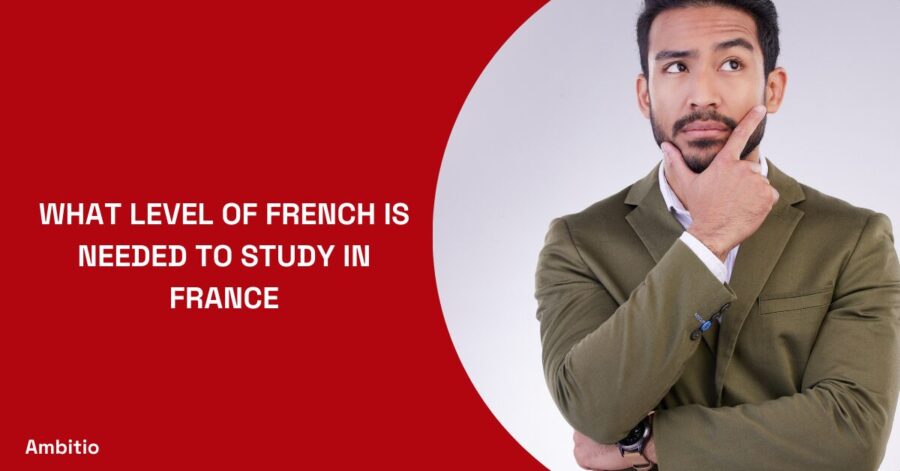14 December 2024
5 minutes read
What Level of French is Needed to Study in France?

Understanding the French Language Level
Aiming to study in France? Then understanding the French language becomes a cornerstone of your preparations. The depth of your French knowledge required largely depends on your chosen program and educational institution. However, possessing a firm grasp of the language can immensely enrich your French academic and cultural journey.
Why Study in France? The Allure of French Education
The allure of French education is not merely in its globally renowned universities. It’s in the historical corridors of institutions, the dynamic student life, the union of tradition and modern teaching methods, and the experience of living in France. Montpellier, with its vibrant student life, Lyon, rich in culture, and Paris, the ever-romantic capital, each offers a unique academic experience.
Studying alongside French students provides an unparalleled immersion into the local culture, traditions, and nuances of the French way of life. Moreover, France’s commitment to research and innovation makes it a top choice for many pursuing higher education. Institutions like Sorbonne University and École Polytechnique are examples of French educational excellence.
Determining Your Level of French: The CEFR Breakdown
Before packing your bags, it’s pivotal to understand where you stand with your French language skills. The Common European Framework of Reference for Languages (CEFR) is an internationally acknowledged system for this purpose.
Starting from A1 (basic level) and extending to C2 (near-native fluency), it provides a clear and detailed measure of linguistic proficiency. While many universities and courses demand at least a B2 level for courses taught in the language, English-taught programs might relieve you of this prerequisite. However, to truly embrace the French lifestyle, a good command of the language is indispensable.
Venturing Beyond Academia: The Everyday Need for French in France
While academic prowess is essential, your life outside the classroom is equally significant. Understanding local news, engaging in cultural activities, and even simple tasks like grocery shopping can become complex without a basic grasp of French. Moreover, interacting with French people, making local friends, and integrating into communities is smoother when you can communicate in the native language.
The Transition: Preparing for Your Move to France
Transitioning to a new country involves more than just academics. It’s about preparing yourself culturally, mentally, and linguistically. From understanding local etiquette to navigating public transport and from relishing French cuisine to decoding regional accents – immersing yourself before the move can make the transition smoother.
Leverage online platforms, engage in language exchanges, or participate in French cultural events in your city. The earlier you start, the better prepared you’ll be.
Visa and Documentation: Your Passport to French Education
France, with its world-renowned institutions, rich history, and vibrant culture, is a dream destination for many students worldwide. However, before you can start your academic journey in this European nation, you need to successfully navigate the visa and documentation process. Here’s a comprehensive guide to help you understand the ins and outs.
Types of Visas for Students
Depending on your study plans and duration, France offers different types of visas for international students:
- Short Stay Visa or “Visa de court séjour pour études”: If your course duration is less than three months, this visa is ideal. It’s typically non-renewable and doesn’t require a residency permit.
- Long Stay Visa or “Visa de long séjour pour études”: For courses longer than three months, you’ll need this visa. It acts as a residency permit for the first year and is renewable.
- Student-examination visa: This visa allows you to come to France to take an entrance exam. If you pass and get admitted to the institution, this visa can be transformed into a long-stay student visa without leaving France.
Essential Documentation for the Visa Application
While specific requirements might vary depending on your country of residence, here are the general documents you’ll need:
- Passport: A valid passport that’s issued in the last ten years and will remain valid for at least three months after your proposed exit from France.
- Application Form: A duly filled and signed long-stay visa application form.
- Photos: Typically, two passport-sized photos meeting the set criteria.
- Proof of Accommodation: A document that shows where you’ll be staying in France, whether it’s a rental agreement, campus housing confirmation, or letter from someone offering you a place to stay.
- Proof of Funds: Evidence that you can financially sustain yourself in France. This can be a bank statement, a guarantor’s letter, or proof of a scholarship.
- Travel Insurance: Valid travel insurance covering your entire duration in France.
- Letter of Acceptance: An official letter from your chosen educational institution confirming your enrollment.
- Medical Certificate: Some consulates might require a medical certificate or proof of a medical examination from an approved doctor.
Post-Arrival in France: The Residency Permit
If you’re on a long-stay visa, after arriving in France, you’ll need to register with the French Office of Immigration and Integration (OFII) or at a dedicated platform for some institutions. This process will validate your visa as a residence permit for the first year. For subsequent years, you’d need to renew this permit.
Cost of Living
France, while synonymous with luxury and opulence, presents a myriad of living cost scenarios for international students. From the bustling streets of Paris to the serene landscapes of the countryside, the cost of living varies widely across regions. Let’s delve into the particulars of managing your finances while pursuing an education in France.
Housing: Your French Abode
- Paris: As the capital city and an epicenter of culture, education, and business, Paris is unsurprisingly the most expensive place to live in France. On average, students might pay anywhere from €800 to €1,200 per month for a studio apartment. Shared accommodations or student residences, known as “foyers,” can be more budget-friendly, ranging from €400 to €700.
- Other Major Cities (Lyon, Nice, Bordeaux): In cities like Lyon or Nice, rents are slightly more affordable than in Paris. A studio can cost between €500 to €900, while shared housing can range from €300 to €600.
- Smaller Towns and Rural Areas: For those studying in smaller towns, the cost can be significantly less. A studio might be available for €300 to €600, and shared accommodations can be as low as €200 to €400.
Food and Dining
- Groceries: On average, students can expect to spend around €200 to €300 per month on groceries. Shopping at local markets and discount supermarkets can help save money.
- Dining Out: A meal at a modest restaurant might cost €10 to €20, while a three-course meal at a mid-range restaurant can range from €30 to €50.
Transportation
- Public Transport: Major cities in France boast extensive public transportation systems. A monthly transport pass in cities like Paris or Lyon can range from €70 to €90.
- Taxis and Rideshares: The starting rate for taxis is around €2 to €3, with a per-kilometer charge. Rideshares, like Uber, are also available in many cities.
Miscellaneous Expenses
- Entertainment: A cinema ticket might cost around €10, and a theater or concert ticket can range from €20 to €100, depending on the event.
- Healthcare: While France has an excellent healthcare system, it’s advisable for students to have health insurance. This can cost anywhere from €20 to €50 per month.
- Mobile and Internet: A monthly mobile plan can range from €10 to €30, depending on the services. Internet charges typically range from €20 to €40 per month.
Conclusion
In essence, France offers an academic and cultural potpourri that is unmatched. Whether you’re a linguistic expert or a beginner, France has something for every international student. The key is preparation, and understanding the level of French you need to study in France is step one. Embrace the journey, and let the French adventure begin!
FAQs
Do I need to be fluent in French to study in France?
Not necessarily. However, basic French can be invaluable for daily life.
How can I improve my French before moving?
Engage in online courses, language exchange programs, or join a local French cultural group.
Are there English-taught bachelor’s programs in France?
Yes, many universities offer English-taught programs, especially for international students.

You can study at top universities worldwide!
Get expert tips and tricks to get into top universities with a free expert session.
Book Your Free 30-Minute Session Now! Book a call now




























